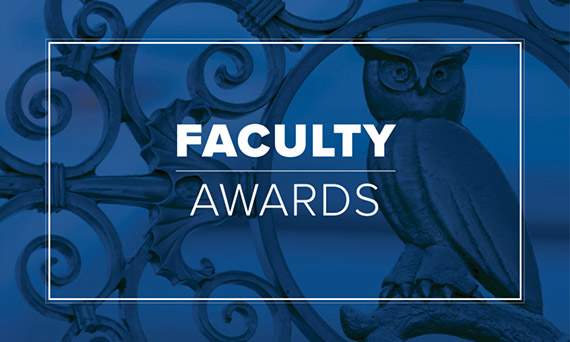|
|
|
|
 Awards and honors recognize faculty achievementsWe celebrate the scholarly and service contributions of University community members to their fields. Recent award recipients include:
- Riccardo Betti, the Laboratory for Laser Energetics’ chief scientist and the Robert L. McCrory Professor in the Department of Mechanical Engineering and in the Department of Physics and Astronomy will receive the 2023 Blaise Pascal Medal in Physics from the European Academy of Sciences
- Audrey Jajosky, an assistant professor of pathology and laboratory medicine, has been named to the American Society for Clinical Pathology’s 2023 40 Under Forty list
- Mark Oldham, an assistant professor of psychiatry, will serve as the American Delirium Society’s acting president beginning in mid-2024
- Roger Oskvig, a professor of clinical medicine, and Mary Tantillo, a professor of clinical nursing in the School of Nursing and a clinical professor in the School of Medicine and Dentistry, received the Edward Mott Moore Awards from the Monroe County Medical Society
- Danae Polsin, a scientist in the High-Energy-Density Experimental Physics Group at the Laser Laboratory for Energetics and an assistant professor of mechanical engineering, received the 2023 Outstanding Young Alum Award from the SUNY Geneseo Alumni Association
- Susana Marcos, the David R. Williams Director of the Center for Visual Science and the Nicholas George Professor of Optics and of Ophthalmology, was recognized as best investigator by Spain’s Federation of Health Innovation Industry
- Christopher Marshall, an assistant professor of physics and astronomy, has been named a recipient of an Early Career Research award from the US Department of Energy
- Jennifer Williams, emergency medicine residency coordinator, was awarded the Emergency Medicine Residents’ Association’s Sherrill Mullinex Residency Coordinator of the Year Award
Team finds racial disparities among patients with implantable cardiac devices 
(Unsplash photo by jesse orrico)
Black patients with implantable cardioverter defibrillators (ICDs) have a significantly higher burden of disease than white patients with the same device, according to a new study from University of Rochester Medical Center cardiology researchers.
The researchers analyzed data from randomized controlled clinical trials conducted over a 20-year period by the Clinical Cardiovascular Research Center at URMC. Not only did Black patients with ICDs tend to be significantly younger than white patients, but they also had a higher rate of post-implant cardiac events and risk of death.
When a patient is at risk for cardiac arrest, an ICD helps to monitor their heart rhythm, and if an abnormality is detected, the device delivers a shock of electricity to reset the heartbeat to a normal rhythm. The study, published in Circulation, examines the rate of events that a patient experiences after their ICD is implanted for the prevention of sudden cardiac death. After three years of monitoring, the risk of ventricular arrhythmia (sustained rapid heartbeat that can lead to sudden cardiac death) was 20 percent for white patients, but 31 percent for Black patients.
Learn about the study’s additional findings and implications.
Department of Defense contract taps Rochester’s expertise in pulsed lasersThe University’s Laboratory for Laser Energetics (LLE) has been awarded a $14.9 million contract with the US Department of Defense (DOD) to study pulsed-laser effects.
In addition to supporting the LLE’s scientific mission, the funding—which approximately doubles the annual funding the University has received from the DOD in recent years—will aid in advancing technology and developing a pipeline of talent to support the broad use of laser-based, directed-energy systems.
Rochester is uniquely poised to support and enhance the US government’s national security efforts in laser science and technology. In addition to housing the two largest lasers in academia, LLE is where the Nobel Prize–winning technique of chirped-pulse amplification was developed.
Find out more about LLE’s contributions to national security.
Apply for the WUN Research Development Fund 2023Apply by Wednesday, September 6
The World Universities Network (WUN) Research Development Fund (RDF) 2023 is now open. The RDF is an annual competitive fund aimed at bringing together researchers to undertake innovative, high-quality, sustainable research that addresses global challenges. Each member institution is permitted to lead two proposals per year but can collaborate on as many as desired. If you are interested in leading a proposal effort or would like more information, please contact the University WUN coordinator, Megan Bennett-Spears. View the RDF guidelines and more information on the Office for Global Engagement website before completing the internal application.
Apply for pilot awards from the Clinical and Translational Science InstituteApply by Monday, September 11 at 5 p.m.
The UR CTSI is now accepting applications for three funding programs that support translational science, the study of the scientific and operational principles underlying each step of the translational process. View the RFA and learn more about the three pilot award categories: Faculty, Trainee, and UNYTE Translational Research Network.
Apply for UR CTSI Novel Biostatistical and Epidemiologic Methods Pilot AwardsApply by Monday, October 16 at 5 p.m.
Apply now to receive one year of funding up to $35,000 to support the development of novel biostatistical and epidemiologic methods that overcome analytic limitations and enhance the validity, accuracy, scope, or speed of clinical or translational research. Learn more.
|
|
|
|
|